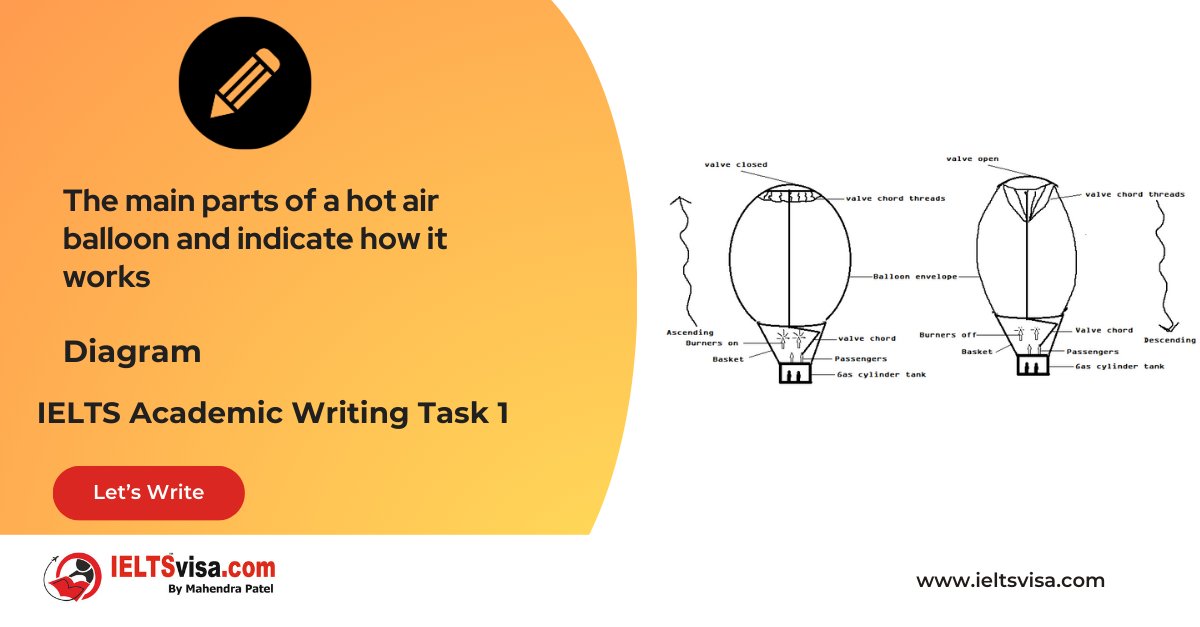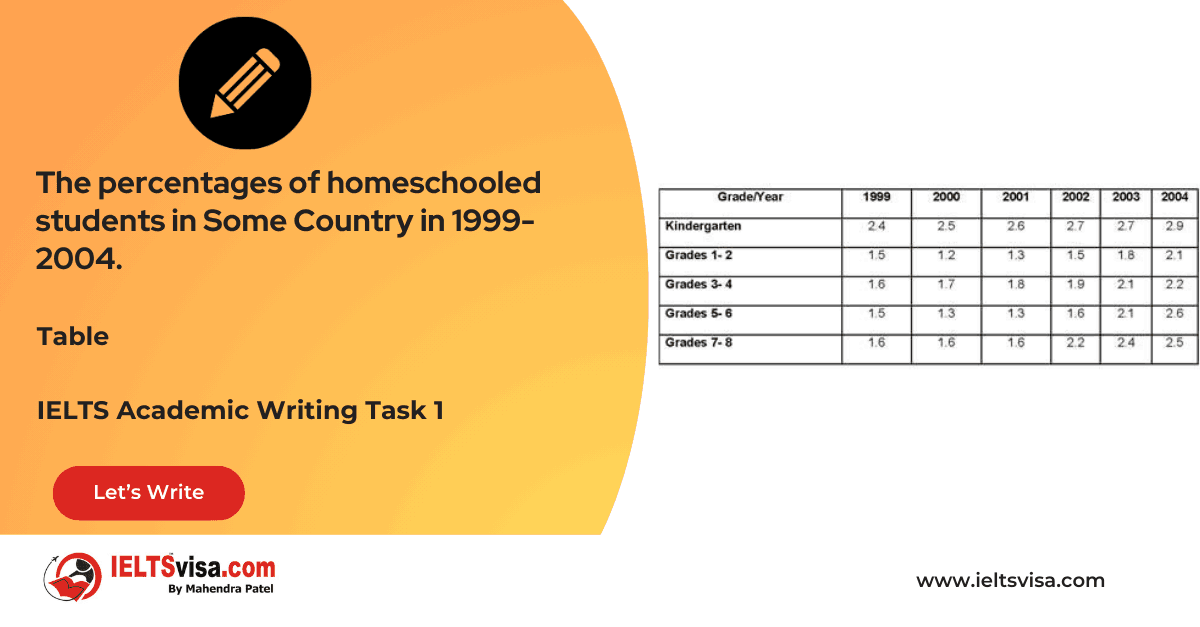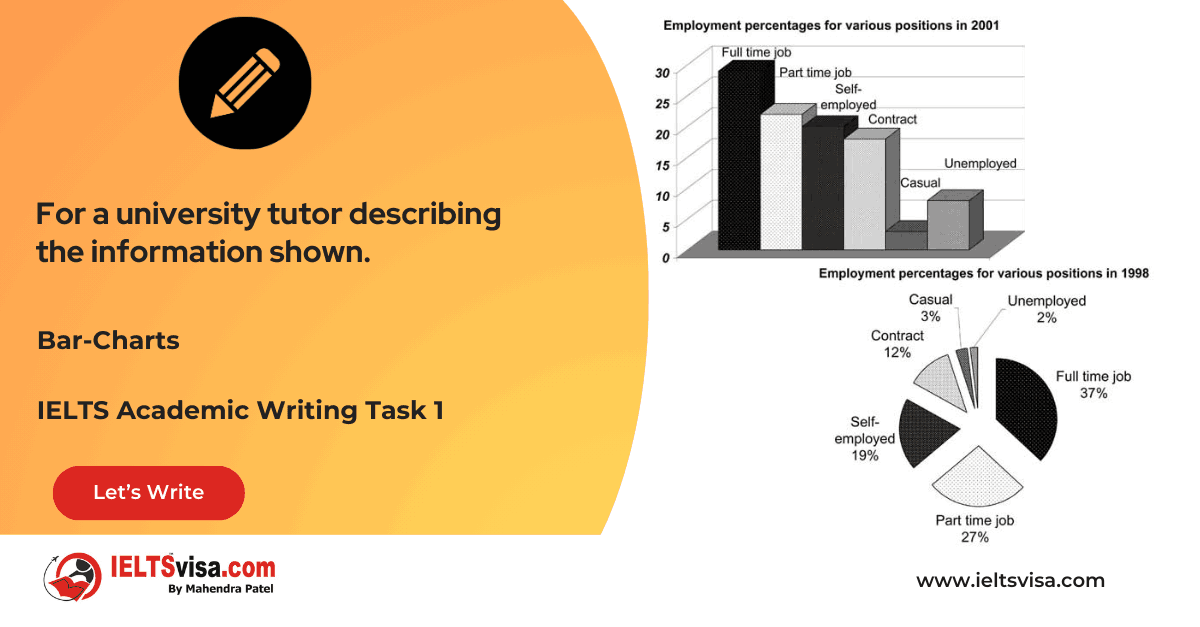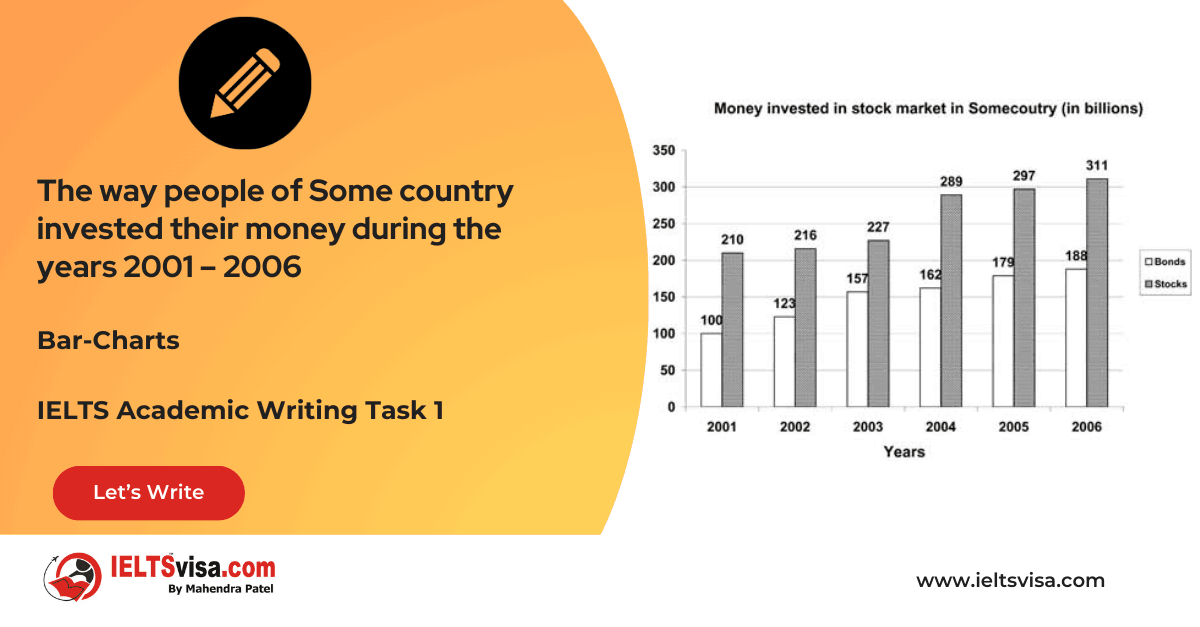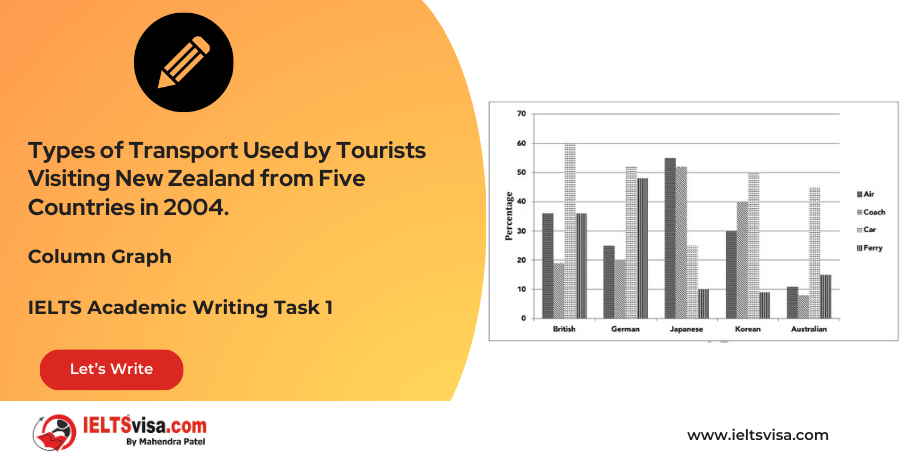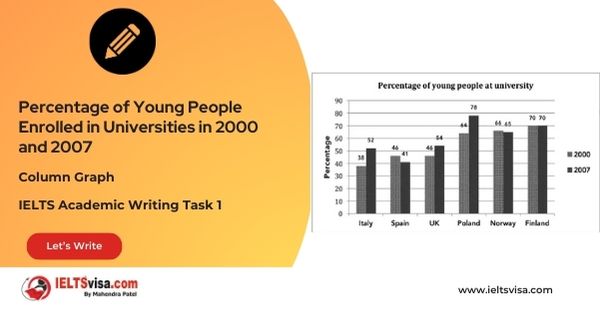The use of renewable energy accounting for the total energy from 1971 to 2006
IELTS Academic Writing Task 1 - Line bar
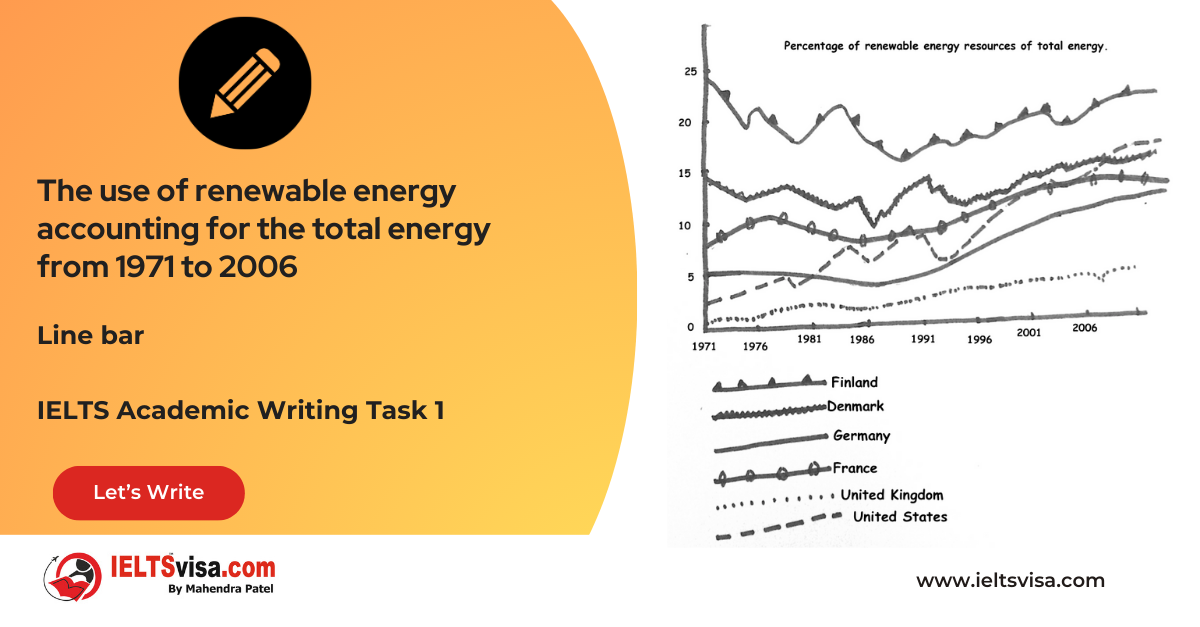
IELTS Writing Task 1 Question
The picture below shows the use of renewable energy accounting for the total energy from 1971 to 2006. Summarise the information by selecting and reporting the main features and make comparisons where relevant.

Common questions for the renewable energy graph
1. Graph Type: Line graph
2. Title: Use of Renewable Energy as a Percentage of Total Energy (1971–2006)
3. What are the units of measurement?: Percentage (%)
4. Who: The graph compares the use of renewable energy in six countries.
5. When: The data spans from 1971 to 2006.
6. Where: The countries compared are Finland, Denmark, France, Germany, the UK, and the USA.
7. Topic: The graph shows the proportion of renewable energy used in total energy consumption over a period of 35 years in various countries.
Comparison Showing and Trends
Comparison 1 : Leading and Lagging Countries
- Finland was the leader in renewable energy use, starting with about 25% in 1971. By 2006, it had returned to this level, despite fluctuations in between. The UK, on the other hand, used the least renewable energy, starting at 1% in 1971 and rising modestly to about 5% by 2006.
Comparison 2 : Changes Over Time in Other Countries
- Denmark saw a fluctuating use of renewable energy, ranging between 10% and 15%. France showed a slight increase, from 8% in 1971 to 11% in 2006. Germany, starting at 5% in 1976, gradually increased its renewable energy use to around 10% by 2006. The USA showed the most significant growth, increasing from 2% to 16%.
Sample Answer
The line graph compares the percentage of renewable energy use from 1971 to 2006 in six countries: Finland, Denmark, France, Germany, the UK, and the USA.
Overall, Finland and the USA showed the most significant renewable energy usage, while the UK remained the lowest throughout the period.
Finland led the countries in renewable energy use, starting with almost 25% in 1971. Despite fluctuations, the percentage increased again and reached the same level by 2006. Denmark was the second highest, with its renewable energy usage fluctuating between 10% and 15% throughout the period.
In contrast, the UK had the lowest renewable energy usage, starting at 1% in 1971 and gradually rising to about 5% by 2006. France’s renewable energy usage grew slightly, from 8% in 1971 to 11% by 2006. Germany’s renewable energy use increased moderately, from 5% in 1976 to 10% by 2006. Notably, the USA saw the most significant increase in renewable energy usage, rising from 2% in 1971 to 16% in 2006, the highest increase among the six countries.
Top 25 Vocabularies
| Vocabulary | Meaning | Synonyms | Examples | Type |
| Fluctuations | Variations or changes, especially upwards and downwards | Oscillations, shifts | “The usage of renewable energy fluctuated between 10% and 15% in Denmark.” | Noun |
| Non-conventional | Not traditional or usual | Alternative, unconventional | “The highest increase in the use of these non-conventional sources of energy was seen in the USA.” | Adjective |
| Escalated | Increased or grew in intensity | Increased, soared | “The use of renewable energy escalated in the UK from 1% in 1971 to near 5% by 2006.” | Verb |
| Proportion | The percentage or part of a whole | Share, fraction | “The proportion of renewable energy used in the UK was the least throughout the period.” | Noun |
| Gradually | Slowly or progressively | Slowly, steadily | “Germany’s use of renewable energy grew gradually to 10% by 2006.” | Adverb |
| Trend | A general direction or tendency | Pattern, movement | “The trend showed a steady increase in renewable energy use.” | Noun |
| Incremental | Increasing gradually or in small amounts | Gradual, step-by-step | “The increase in renewable energy use was incremental.” | Adjective |
| Slightly | To a small degree or extent | Marginally, minimally | “France’s renewable energy use grew slightly during the period.” | Adverb |
| Peak | The highest point or level | Apex, zenith | “Finland reached a peak of renewable energy use by 2006.” | Noun |
| Consistently | Happening in the same way over time | Steadily, regularly | “Denmark’s renewable energy use remained consistently between 10% and 15%.” | Adverb |
| Dramatic | Sudden or striking in effect | Significant, striking | “The USA saw a dramatic increase in renewable energy use by 2006.” | Adjective |
| Stable | Not likely to change or fluctuate significantly | Steady, constant | “The UK had a stable increase in renewable energy use.” | Adjective |
| Marginal | Small or slight in effect or degree | Minor, negligible | “Germany’s increase in renewable energy use was marginal compared to others.” | Adjective |
| Substantial | Large in amount or importance | Considerable, significant | “Finland showed a substantial increase in renewable energy use.” | Adjective |
| Subsequently | Happening after something else | Afterwards, later | “The use of renewable energy increased, subsequently reducing fossil fuel reliance.” | Adverb |
| Proportionately | In a way that relates to the size or amount of something | Relatively, comparably | “The increase in renewable energy was proportionately higher in the USA.” | Adverb |
| Preceding | Coming before something else | Prior, earlier | “The preceding decade saw only small changes in renewable energy use.” | Adjective |
| Plateau | A state of little or no change after a period of growth | Stabilize, level off | “After 1992, renewable energy usage in Germany plateaued.” | Noun |
| Significantly | In an important or large way | Substantially, notably | “The proportion of renewable energy use increased significantly in the USA.” | Adverb |
| Fluctuating | Changing frequently in a way that’s unpredictable | Varying, shifting | “Denmark’s renewable energy use was fluctuating over the years.” | Adjective |
| Attain | To reach or achieve something | Achieve, reach | “The USA attained the highest renewable energy usage by 2006.” | Verb |
| Rebound | To recover or return to a previous state | Recover, bounce back | “The renewable energy use rebounded after the 1990s.” | Verb |
| Tend | To show a tendency or inclination towards something | Incline, lean | “France tended to have a steady increase in renewable energy use.” | Verb |
| Moderate | To change something to a less extreme or more balanced state | Adjust, temper | “Germany’s increase in renewable energy was moderate compared to others.” | Adjective |
| Proliferate | To increase or spread rapidly | Multiply, expand | “The use of renewable energy began to proliferate in the USA after 1990.” | Verb |

Our Books
Master IELTS Speaking Part 1
IELTS Writing Task 1 Book
IELTS Writing Task 2 Book
Writing Task 1 Question Types
Practice IELTS Other Modules
IELTS Listening
The IELTS Listening test assesses how well you can understand spoken English in various contexts. It lasts about 30 minutes and is divided into four sections with a total of 40 questions. The listening tasks become increasingly difficult as the test progresses.
IELTS Academic Reading
The IELTS Academic Reading section assesses your ability to understand and interpret a variety of texts in academic settings. It is designed to evaluate a range of reading skills, including skimming for gist, reading for main ideas, reading for detail, understanding inferences, and recognizing a writer's opinions and arguments.
IELTS Speaking
The IELTS Speaking test assesses your ability to communicate in English on everyday topics. It lasts 11-14 minutes and consists of three parts: introduction, cue card, and a discussion based on the cue card topic.
IELTS General Reading
IELTS General Reading tests your ability to understand and interpret various types of texts. Here are some key areas and types of content you can expect to encounter in the reading section, along with tips for effective preparation.
IELTS Academic Writing Task 1
In IELTS Academic Writing Task 1, you are presented with a visual representation of information, such as graphs, charts, tables, or diagrams, and you are required to summarize, compare, or explain the data in your own words.
IELTS General Writing Task 1
In IELTS General Writing Task 1, you are required to write a letter based on a given situation. The letter can be formal, semi-formal, or informal, depending on the prompt. Here’s a breakdown of the key components to include in your letter
IELTS Academic Writing Task 2
In IELTS Academic Writing Task 2, you are required to write an essay in response to a question or topic. Here’s a guide to help you understand the essential elements of this task
IELTS Exam Tips
To succeed in the IELTS exam, practice regularly, familiarize yourself with the test format, improve your vocabulary, develop time management skills, and take mock tests to build confidence.
Grammer for IELTS
Grammar is the foundation of effective communication in English. Understanding tense usage, subject-verb agreement, and sentence structure enhances clarity and coherence in writing and speaking.
Vocabulary for IELTS
Vocabulary plays a crucial role in the IELTS (International English Language Testing System) exam, especially in the Speaking and Writing sections. Here’s an overview of why vocabulary is important and how it impacts your performance
RECENT IELTS SAMPLES QUESTIONS AND ANSWERS
Task 1 – Diagram – A conference hall built in 1981 and planned for 2020
20:00 Start Pause Stop [df_adh_heading title_infix="IELTS Writing Task 1 Question" use_divider="on"...
Task 1 – Table – The percentages of homeschooled students in Some Country in 1999-2004.
20:00 Start Pause Stop [df_adh_heading title_infix="IELTS Writing Task 1 Question" use_divider="on"...
Task 1 – Table – For a university tutor describing the information shown.
20:00 Start Pause Stop [df_adh_heading title_infix="IELTS Writing Task 1 Question" use_divider="on"...
Task 1 – Bar-Charts – The way people of Some country invested their money during the years 2001 – 2006
20:00 Start Pause Stop [df_adh_heading title_infix="IELTS Writing Task 1 Question" use_divider="on"...
Task 1 – Diagram – Rainwater Harvesting and Conversion to Drinking Water in an Australian Town.
20:00 Start Pause Stop [df_adh_heading title_infix="IELTS Writing Task 1 Question" use_divider="on"...
Task 1 – Column graph – Percentage of Young People Enrolled in Universities in 2000 and 2007.
20:00 Start Pause Stop [df_adh_heading title_infix="IELTS Writing Task 1 Question" use_divider="on"...

